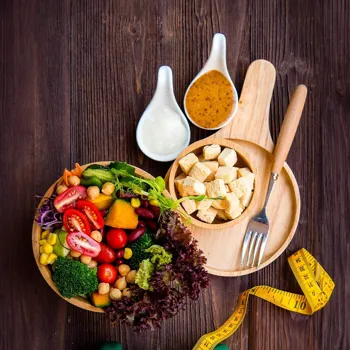Discover 10 Essential Tips for Healthy Travel Nutrition. Stay energized and well while on the go. Read on!
Traveling, whether for work or a much-needed vacation, can throw your healthy routine for a six.
All those tempting street foods, irregular meal timings, and a general disruption to your normal schedule can leave you feeling sluggish and prone to falling ill. But fear not, fellow travelers!

Maintaining your health while exploring new places is totally achievable. With a little planning and some smart choices, you can ensure your body stays happy and energized throughout your journey. Let's dive into ten simple yet effective tips to navigate the world of on-the-go nutrition.
Pack Smart, Eat Smarter
The golden rule of healthy travel: be prepared! Before you even lock your suitcase, carve out some time to assemble a travel-friendly snack pack. Think along the lines of nuts, like almonds and walnuts, or seeds like pumpkin and sunflower.
These are loaded with healthy fats, protein, and fiber – the perfect trifecta for keeping you feeling full and energized. Carry dry fruits like dates and raisins; they provide a natural sugar boost when you need a quick pick-me-up. Don’t forget the good old granola bars!
Choose varieties with less added sugar and more whole grains. These readily available snacks will help you avoid impromptu binges of oily or sugary snacks when hunger strikes, especially at airports or train stations where healthy options can be scarce.
Remember to pack them in reusable containers or resealable bags to minimize wastage; a small step for you, a giant leap for the environment! Carrying your own snacks also gives you better control over portion sizes, helping you avoid overeating simply out of boredom or convenience.
You can also explore options such as roasted chickpeas (chana) which are a protein packed snack and can be easily made at home.
Having healthy snacks on hand will prevent you from making impulsive food choices.
Think about the ease with which you can grab a packet of chips or a sugary drink when you're running late or feeling tired. With pre-packed snacks, you have a nutritious alternative readily available.
This proactive approach will keep your energy levels stable, prevent unnecessary weight gain, and support your overall well-being throughout your travels.
It can also be comforting to have familiar foods with you, especially when traveling to places where the cuisine might be drastically different from what you're used to. This is especially helpful to children who are travelling with you.
Remember to check with the country regulations about carrying food across international borders. Additionally, packing your favorite protein bars or dried fruit, especially when adhering to dietary restrictions such as vegan or diabetic needs will make your travel carefree.
Packing a refillable water bottle is the cornerstone of hydration while travelling.
Hydrate, Hydrate, Hydrate
Water is your best friend, especially when you're on the move. Flying can be incredibly dehydrating thanks to the low humidity in airplane cabins. And even if you're traveling by train or car, climate control systems can sap the moisture from your skin.

Dehydration can lead to fatigue, headaches, and even decreased cognitive function – not exactly ideal when you're trying to navigate a new city or focus on an important meeting. Make it a point to carry a reusable water bottle with you and refill it whenever possible.
You can find water fountains at airports, train stations, and even many restaurants. Sipping water steadily throughout the day will keep your energy levels up and your body functioning optimally.
Many cities also offer filtered water refill stations – do a quick online search before you go to find locations along your route. Avoid excessive consumption of sugary drinks like sodas and packaged fruit juices. These offer very little actual hydration and are loaded with empty calories.
Instead, infuse your water with slices of lemon, cucumber, or mint for a refreshing and healthy twist.
Staying hydrated is not only important for your physical health but also for your mental well-being.
Dehydration can lead to a decrease in concentration, making it harder to stay focused and alert. This can be particularly problematic if you're traveling for work and need to be sharp and productive.
By keeping yourself well-hydrated, you'll be able to think more clearly, make better decisions, and enjoy your travels more fully. Don't rely solely on thirst to tell you when you need to drink. Thirst is often a late indicator of dehydration.
Instead, aim to drink regularly throughout the day, even if you don't feel thirsty. A good rule of thumb is to take a sip of water every 15-20 minutes. Try setting reminders on your phone to prompt you to drink water regularly, especially when you are busy with travel arrangements.
Carry electrolyte packets as well as they will keep you from feeling tired by replenishing electrolytes lost due to climate conditions.
Seek Out Local Markets
Instead of relying solely on restaurants and packaged foods, make an effort to visit local markets. Exploring local markets is a fantastic way. They are treasure troves of fresh produce, local spices, and unique snacks that you won't find anywhere else.
Plus, shopping at local markets supports the local economy and gives you a glimpse into the culture of the place you're visiting. Look for fresh fruits, vegetables, and whole grains. You can often find vendors selling freshly squeezed juices or simple snacks made with wholesome ingredients.
Don't be afraid to try new things! Ask the vendors for recommendations and learn about the local produce. With a little adventurous spirit, visiting local markets can be a fun and healthy activity that enriches your travel experience.
Moreover, markets give you an opportunity to purchase your favourite fruits at affordable rates.
This is an excellent opportunity to discover exotic fruits and vegetables that you've never tried before. Many cultures have unique ingredients that offer different nutritional benefits.
For example, you might find a local fruit that's particularly rich in vitamin C or a traditional spice blend that's known for its antioxidant properties. Embrace the opportunity to expand your culinary palate and learn about the health benefits of the local cuisine.
Mindful Eating Matters
Even when you're surrounded by delicious and tempting foods, mindful eating is critical. Traveling can be a whirlwind of new experiences, and it's easy to get caught up in the excitement and not pay attention to what you're eating.

But taking a few moments to be present and mindful while you eat can make a big difference in your overall health and well-being. Before you start eating, take a few deep breaths and notice the smells, colors, and textures of the food in front of you. Chew slowly and savor each bite.
Pay attention to how your body feels as you eat – are you truly hungry, or are you just eating out of boredom or stress? Put down your fork between bites and take a moment to reflect on the flavors and sensations.
Avoiding mindless eating will also reduce overall calories consumed.
Mindful eating reduces stress during travel as you are aware of surroundings. Being aware of your food can help you avoid overeating and making unhealthy choices. It can also help you appreciate the food you're eating and find more satisfaction in your meals.
Traveling can be stressful, and it's easy to turn to food for comfort. However, mindful eating can help you break this cycle and develop a healthier relationship with food.
If you find yourself reaching for food when you're not truly hungry, take a moment to pause and ask yourself what you're really feeling. Is it stress, boredom, or loneliness?
Find healthy ways to cope with these emotions, such as taking a walk, listening to music, or talking to a friend and avoid processed food.
Protein Power
Prioritize protein in your meals, especially if you're physically active during your travels. Protein is essential for building and repairing tissues, as well as keeping you feeling full and satisfied. It can also help regulate blood sugar levels and prevent energy crashes.

Look for lean protein sources like lentils, and other daals, tofu, paneer or even nuts and seeds. These are all vegetarian sources which can be incorporated easily in your diet. When eating out, choose dishes that feature these protein sources.
For example, order a lentil-based curry with rice or a salad with chickpeas and tofu.
Try to avoid fried food even if it is vegetarian since fried food are heavy to digest.
While travelling avoid over eating.
Instead of ordering a large meal order a small and a snack that can sustain you for longer hours. Protein rich food also keeps you satisfied for longer duration of time, preventing you to indulge in unhealthy oily food.
Focus to choose local cuisine which uses a lot of protein source and you can have a flavour of their culture as well as keep you going with a healthy meal.
Walk the Talk
Incorporate physical activity into your travel itinerary. One of the best ways to stay healthy while traveling is to stay active. Instead of relying solely on taxis or public transport, try walking whenever possible. Walking is a great way to explore new cities, get some exercise, and burn calories.

Take the stairs instead of the elevator, or walk to a nearby restaurant instead of ordering room service. If you're staying in a hotel with a gym, take advantage of it. Even a short workout can make a big difference in your energy levels and overall well-being.
Also, plan hiking trips and nature trails to get your body moving and absorb your surrounding.
Traveling is also about exploring places and what better way to explore than to use your own body. Do some stretching in your hotel room every morning to wake up your muscles and improve your flexibility.
Stretch before you are about to travel and while you are resting to avoid cramps because of travelling. You can also pack a set of resistance bands for light, portable workouts.
This will also help you make some social connections and meet likeminded people.












